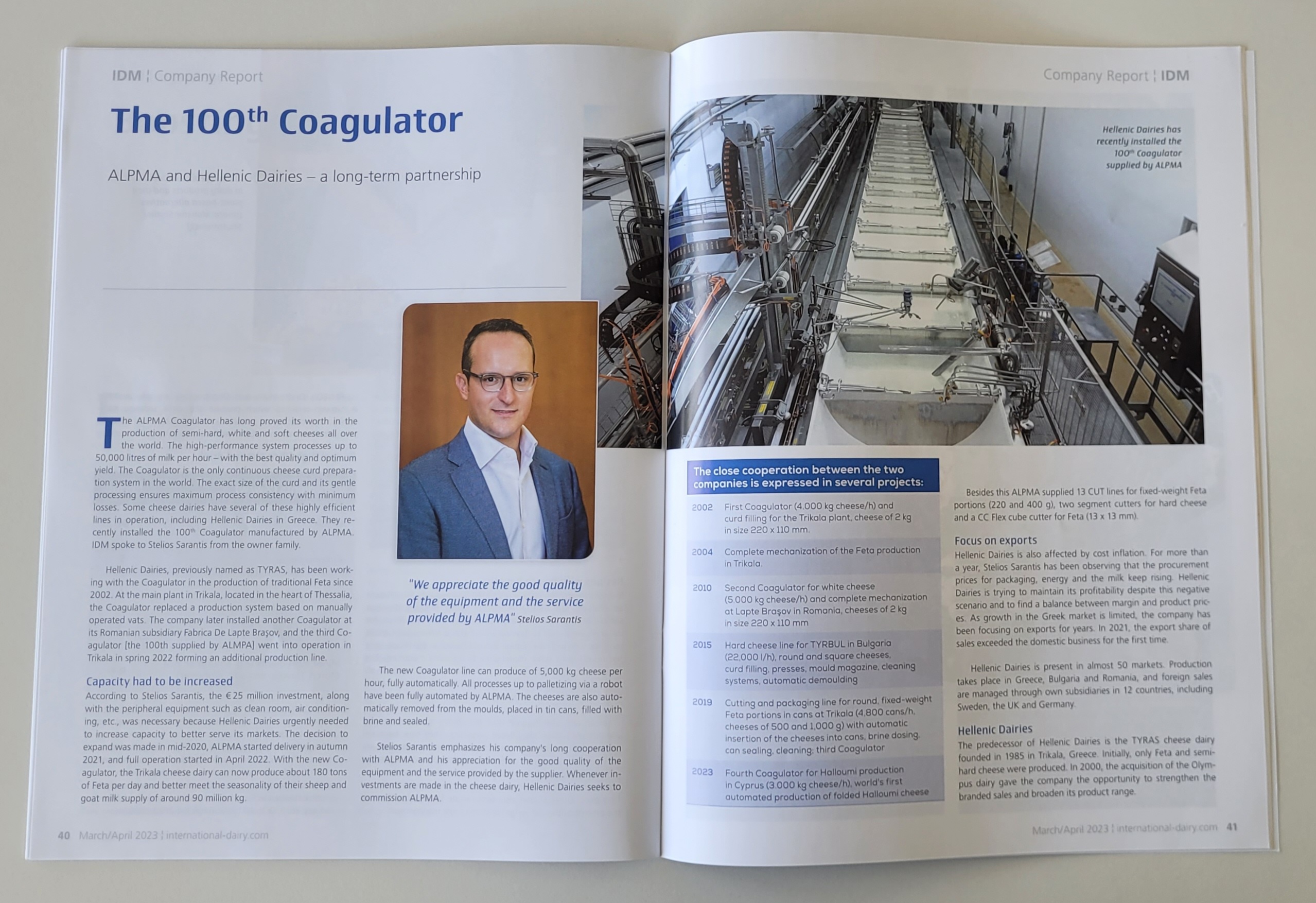The ALPMA Coagulator has long proved its worth in the production of semi-hard, white and soft cheeses all over the world. The high-performance system processes up to 50,000 litres of milk per hour - with the best quality and optimum yield. The Coagulator is the only continuous cheese curd preparation system in the world. The exact size of the curd and its gentle processing ensures maximum process consistency with minimum losses. Some cheese dairies have several of these highly efficient lines in operation, including Hellenic Dairies in Greece. They recently installed the 100th Coagulator manufactured by ALPMA. IDM spoke to Stelios Sarantis from the owner family of Hellenic Dairies.
Hellenic Dairies, previously named as TYRAS, has been working with the Coagulator in the production of traditional Feta since 2002. At the main plant in Trikala, located in the heart of Thessalia, the Coagulator replaced a production system based on manually operated vats. The company later installed another Coagulator at its Romanian subsidiary Fabrica De Lapte Brasov, and the third Coagulator [the 100th supplied by ALMPA] went into operation in Trikala in spring 2022 forming an additional production line.
Capacity had to be increased
According to Stelios Sarantis, the €25 million investment, along with the peripheral equipment such as clean room, air conditioning, etc., was necessary because Hellenic Dairies urgently needed to increase capacity to better serve its markets. The decision to expand was made in mid-2020, ALPMA started delivery in autumn 2021, and full operation started in April 2022. With the new Coagulator, the Trikala cheese dairy can now produce about 180 tons of Feta per day and better meet the seasonality of their sheep and goat milk supply of around 90 million kg.
The new Coagulator line can produce of 5.000 kg cheese per hour, fully automatically. All processes up to palletizing via a robot have been fully automated by ALPMA. The cheeses are also automatically removed from the moulds, placed in tin cans, filled with brine, and sealed.
Stelios Sarantis emphasizes his company's long association with ALPMA and his appreciation for the good quality of the equipment and the service provided by the supplier. Whenever investments are made in the cheese dairy, Hellenic Dairies seeks to commission ALPMA.
The close cooperation between the two companies is expressed in several projects:
2002: First Coagulator (4.000 kg cheese/h) and curd filling for the Trikala plant, cheese of 2 kg in size 220 x 110 mm.
2004: Complete mechanization of the Feta production in Trikala.
2010: Second Coagulator for white cheese (5.000 kg cheese/h) and complete mechanization at Lapte Brasov in Romania, cheeses of 2 kg in size 220 x 110 mm
2015: Hard cheese line for TYRBUL in Bulgaria (22,000 l/h, round and square cheeses, curd filling, presses, mould magazine, cleaning systems, automatic demoulding
2019: Cutting and packaging line for round, fixed-weight fat portions in cans at Trikala (4,800 cans/h, cheeses of 500 and 1,000 g) with automatic insertion of the cheeses into cans, sheet dosing, can sealing, cleaning
2023: Fourth Coagulator for Halloumi production in Cyprus (3.000 kg cheese/h), world's first automated production of folded Halloumi cheese.
ALPMA supplied besides this 13 CUT lines for firm-weight Feta portions (220 and 400 g), two segment cutters for hard cheese, a CC Flex cube cutter for Feta (13 x 13 mm).
Focus on exports
Hellenic Dairies is also affected by cost inflation. For more than a year, Stelios Sarantis has been observing that the procurement prices for packaging, energy and the milk keep rising. Hellenic Dairies is trying to maintain its profitability despite this negative scenario and to find a balance between margin and product prices. As growth in the Greek market is limited, the company has been focusing on exports for years. In 2021, the export share of sales exceeded the domestic business for the first time.
Hellenic Dairies is present in almost 50 markets. Production takes place in Greece, Bulgaria and Romania, and foreign sales are managed through own subsidiaries in 12 countries, including Sweden, the UK and Germany.
Hellenic Dairies
The predecessor or mother of Hellenic Dairies is the TYRAS cheese dairy founded in 1985 in Trikala, Greece. Initially, only Feta and semi-hard cheeses were produced. In 2000, the acquisition of the Olympus dairy gave the company the opportunity to strengthen the branded sales and broaden its product range. This was followed in 2004 by the foundation of TRYBUL cheese dairy in Bulgaria and, as so far final expansion step, the Fabrica De Lapte Brasov dairy in Romania was built on a greenfield and expanded to become the industry leader in the country. Today, Hellenic Dairies processes a total of 200 million kg of cow's milk and 100 million kg of sheep's and goat's milk. It employs 1,700 people, 550 of them at its headquarters in Trikala. Turnover in 2022 it estimated to be around € 480 million.
Hellenic Dairies includes the following companies:
Hellenic Dairies S.A., Kliafas S.A.
TYRBUL in Bulgaria
Fabrica De Lapte Brasov in Romania
as well as the various subsidiaries under the Hellenic Dairies umbrella.
Hellenic Dairies is currently expanding to Cyprus. A new Halloumi cheese dairy is being built there. In contrast to established Halloumi producers, the fully automated operation is scheduled to start in the first half of 2024. An investment of € 45 million will be made.






